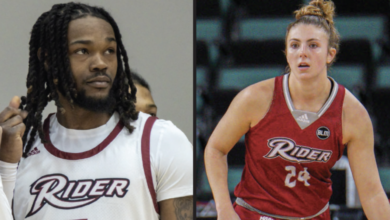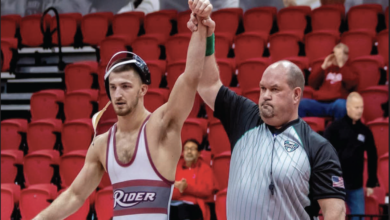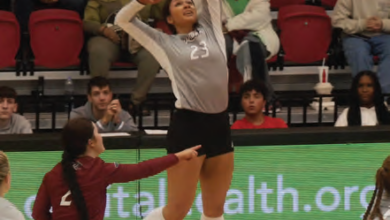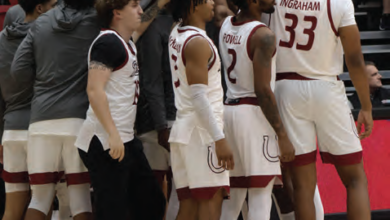Athletics among first to get mental health certification
By Dylan Manfre and Bridget Gum
Rider Assistant Athletic Trainer Priya Mehrish wants student-athletes to place the same emphasis on their mental health as they do on their physical health.
“Let’s put it this way, all of us go every year for a physical right?” Mehrish said via Zoom. “You go see your primary care or physical; we don’t do anything about mental health.”
Mehrish spearheaded an initiative which resulted in all of Rider’s head coaches and lead assistants from its 20 sports, administrative staff and athletic trainers, receiving certification in Mental Health First Aid, a national program committed to education about mental health for adults.
The voluntary training was an effort for coaches and staff to be able to expose student-athletes to resources available to them so they can make smart decisions about their mental health.
Rider Athletics became one of the nation’s first athletic departments to have a majority of its staff become certified in Mental Health First Aid, per a release from Rider Athletics.
“All of the coaches were totally involved. They have seen the need for it,” Mehrish said. “They are working with athletes so closely and they are one of the first people who get to see if there are any signs or concerning signals that an athlete is exhibiting.”
Hearing that few schools have athletic programs that are certified in Mental Health First Aid surprised women’s basketball sophomore center Victoria Toomey, who encouraged others to participate in similar training.
“It honestly surprised me a lot,” Toomey said. “I’m proud to go to Rider and I think it’s awesome that they’re one of the schools out there that have done that. I think it’s definitely important for other schools to jump on that bandwagon and join them because athletes are more than just athletes. They’re a person too, behind that skill and that player. I think it’s important for all coaches to know how to deal with that because so many athletes go through these things and don’t tell anyone about it.”
The participants were engaged in self-paced training for two hours prior to joining a five-hour group Zoom call with Dr. Jennifer Ostrowski, the program director for the doctorate in athletic training at Moravian College. Everyone involved had to complete a test as a precursor to the Zoom training.
Mehrish went through the same training with Dr. Ostrowski when she was a graduate student at Moravian College.
Women’s Basketball Assistant Coach Steve Harney, who went through the training, said one of his takeaways from the program was the A.L.G.E.E. method. This stands for: Approach, Listen, Give Advice, Encourage Out and Encourage In. He mentioned the acronym served as a guide for people who are less educated on how to handle potential mental health scenarios.
“It’s like [an] Approach. So how do you approach somebody that appears to be going through some type of mental health scenario. So it’s Approach, Listen, Give Advice and stuff like that. Encourage Out and Encourage In,” Harney said on a Zoom call.
“Encourage Out, have them seek out professional help outside of you because your job is not a mental health professional, your job is essentially a mental health advocate and kind of to guide them along the way if you will. And then Encourage In, encourage them to work with different coping skills. Introduce them to different coping skills that work in the meantime as they start working toward getting the professional help they need.”
Mehrish believed the training was beneficial to everyone because of the multitude of “hats” student-athletes have to wear, along with their lives on campus.
They experience added stressors that regular college students may not which causes them to sometimes carry a heavier burden.
“The athlete ‘hat,” that role has many responsibilities. They have a responsibility to show up for strength and conditioning training. They have a responsibility to be at practice. They have a responsibility to show up for any other training program their coaches do. They have a responsibility to perform,” Mehrish said. “So that is a lot of added stress to a student-athlete, so studies, sports, performance — because their performance is linked to expectations of coaches, expectations that parents have from their kids. When there’s a scholarship attached [so] there’s the money component on their performance.”
Toomey would agree. Student-athletes face an incredible amount of pressure. She has been vocal about her mental health struggles and said her mindset had affected her play during her first season at Rider. Basketball served as “an escape” for her, however, the performance anxiety took a toll.
She was no longer the star center at Dunmore High School in Pennsylvania. Last season, she averaged 5.7 minutes off the bench on a Rider team with six seniors, two of whom now play professionally.
“Just the confidence factor [of the game],” said Toomey, who started a blog called ‘In the Clouds’ to help cope with the lockdown. “I was a lot more hesitant and nervous and anxious overall. I really couldn’t help it. Now I have a better handle on that. And part of that was being a freshman and being new and getting used to the game.”
Mehrish was excited to know Rider became one of the only institutions in the nation to complete this certification and realizes the importance of having tough conversations.
“That is huge, and I hope that other schools follow because it is important to recognize the need to have training in this field. It’s more important now than ever,” Mehrish said. “We need to put an end to the stigma that is attached to mental health, have conversations on campus, talk openly about it because that is the only way we can help.



